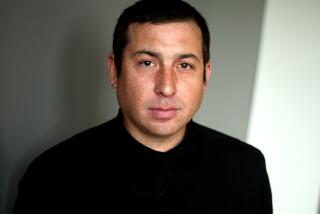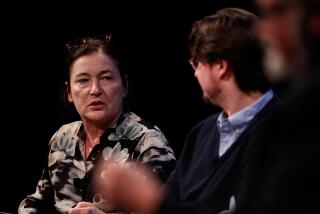Anthony Burgess; Prolific Novelist, Linguist
- Share via
Anthony Burgess, the prodigious author, linguist and scholar who gazed into the future and found such quirky scenarios as “A Clockwork Orange,” died Thursday of cancer.
A spokeswoman for Hutchinson, his publisher, said from London that Burgess, who wrote more than 50 novels and dozens of nonfiction works, died of cancer in a London hospital. He was 76 and had been ill for some time, she added.
Burgess had left Britain in 1968 after the death of his first wife, Lynne.
From 1969 to 1974, he taught English in the United States, at Princeton and Columbia universities, the University of North Carolina and City College of New York.
He settled in the Mediterranean, first in Malta--before being driven out by censors who believed that he was a subversive and cut holes in his copies of the Times of London--and finally in Monte Carlo.
He was born John Anthony Burgess Wilson in Manchester. After his mother and sister died in the 1918 flu epidemic, he was brought up by his father, who was a pianist, and a coarse Irish stepmother who owned a tavern in the northern England city.
He wrote in his memoirs (“Little Wilson and Big God” and “You’ve Had Your Time”) that his parents ignored him and that he turned to sketching and writing to keep himself amused.
His father helped him learn piano and from that composing. Throughout his life, Burgess wrote a variety of songs, symphonies, concertos and sonatas.
After he became a successful novelist, he was criticized for his aloof characters that are bereft of emotion. He admitted that he found it difficult to imbue his work with affection when he had received so little himself.
In his youth, he had hoped to become a musician and became musical director of a special British Army services unit entertaining troops in Europe during World War II.
But after the war he turned to academia and work as a lecturer in phonetics for the Ministry of Education. He was named master at a grammar school near Oxford where he wrote poems and fiction in his spare time.
He next became an education officer for the Colonial Office in Malaya and Borneo. In the mid-1950s his first three novels were published: “Time for a Tiger,” “The Enemy in the Blanket” and “Beds in the East.”
They came to be known as “The Malayan Trilogy” and were published under one title in the United States: “The Long Day Wanes.”
That marked the beginning of a lengthy romance with American readers who were generally more forgiving of Burgess’ grotesque surrealism than his fellow Britons. Burgess did not take the slight lightly. In 1984, after the Times of London published a list of the 100 best novels since 1939--a list that ignored Burgess’ prolific work--he wrote a critique of his own: “Ninety-Nine Novels: The Best in English Since 1939.” He did not mention any of his own but left little doubt who the 100th spot belonged to.
Burgess’ literary output increased mightily after 1959, when he was told, erroneously as it turned out, that a brain tumor had given him only months to live.
He set out to leave a literary legacy and enough royalties to support a widow.
“Because of hangovers,” he wrote in “You’ve Had Your Time,” “marital quarrels, creative deadness . . . and sheer morbid gloom, I was not able to achieve more than 5 1/2 novels of very moderate size in that pseudo-terminal year.” Still, he hastened to point out, “it was very nearly E.M. Forster’s whole long life’s output.”
Although his doctors were proved wrong, Burgess seldom slackened the pace of his writing for the remainder of his life.
At one point his output was so massive that his publisher insisted on publishing two of his novels under pseudonyms for fear that the public would equate volume with mediocrity.
His work defied categorization. Considered both “elite” and “popular” by some critics, his fictional world ranged from a satiric examination of life’s travails in a newly liberated East African nation (“Devil of a State”) to the sexual adventures of a Britisher trying to dump dozens of “drylon” dresses on the Soviet black market (“Honey for the Bears”).
In 1962, after successes with “Inside Mr. Enderby,” “The Worm and the Ring” and “One Hand Clapping,” Burgess served up what was to be his signature work, “A Clockwork Orange.”
It deals with the brutality of a psychopathic youth he called Alex and his “droogs,” a gang of hoodlums who exist in a drug-saturated culture of the future.
Burgess even invented a language for the “droogs,” who preferred their brutality and sexual assaults accompanied by the works of Beethoven. He called it “Nadsat,” a combination of English slang and Russian words.
The author was fascinated with language. Besides English, Burgess spoke French, Spanish, German, Russian, Italian, Mandarin Chinese and Malay and wrote a book on usage, “English Made Plain.”
Stanley Kubrick’s filmed version of “A Clockwork Orange” won the New York Film Critics Award for best picture of 1971.
Baptized Roman Catholic and educated by Jesuits before receiving a degree in English at Manchester University, Burgess once told the Guardian newspaper that he “abandoned religion when I was young and then went back to it out of fear and later out of interest.”
His stormy first marriage ended with the death of his wife from cirrhosis of the liver. Soon after, Burgess married Liliana Macellari, who introduced him to the 4-year-old son he unknowingly had from an earlier affair with her.
He spent his last years working every day from 10 a.m. to 5 p.m., producing 1,000 words at each sitting, laboring over a large architect’s table. For reasons only he seemed to understand, he utilized a word processor for journalism and a typewriter for fiction.
In addition to his novels, television scripts, almost weekly journalistic contributions and literary criticism, Burgess translated a number of works, including “Cyrano de Bergerac” by Edmond Rostand from French and Sophocles’ “Oedipus Rex” from Greek.
He also wrote a Broadway musical, “Cyrano,” which was performed in 1973.
Burgess was a fellow of the Royal Society of Literature and a Commandeur des Arts et des Lettres of France.
Perhaps his massive outpouring of words was best exemplified several years ago when neither his agent, his publisher, nor his entry in “Who’s Who” could provide the exact number of books he had written.
More to Read
Sign up for our Book Club newsletter
Get the latest news, events and more from the Los Angeles Times Book Club, and help us get L.A. reading and talking.
You may occasionally receive promotional content from the Los Angeles Times.









